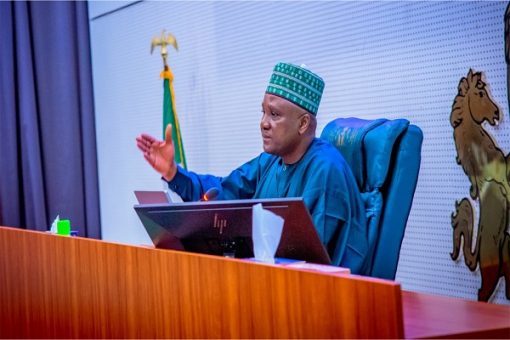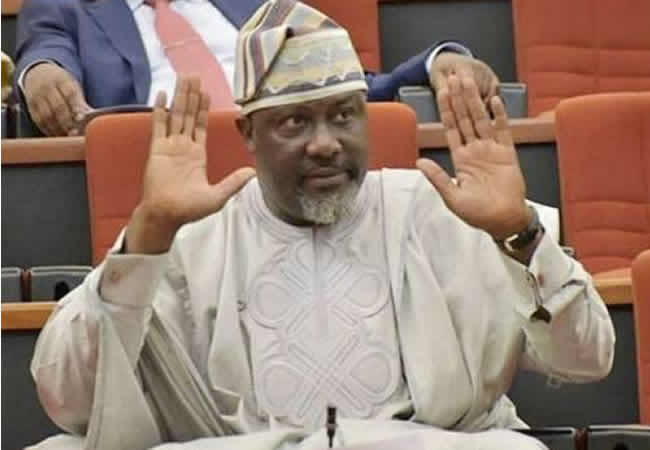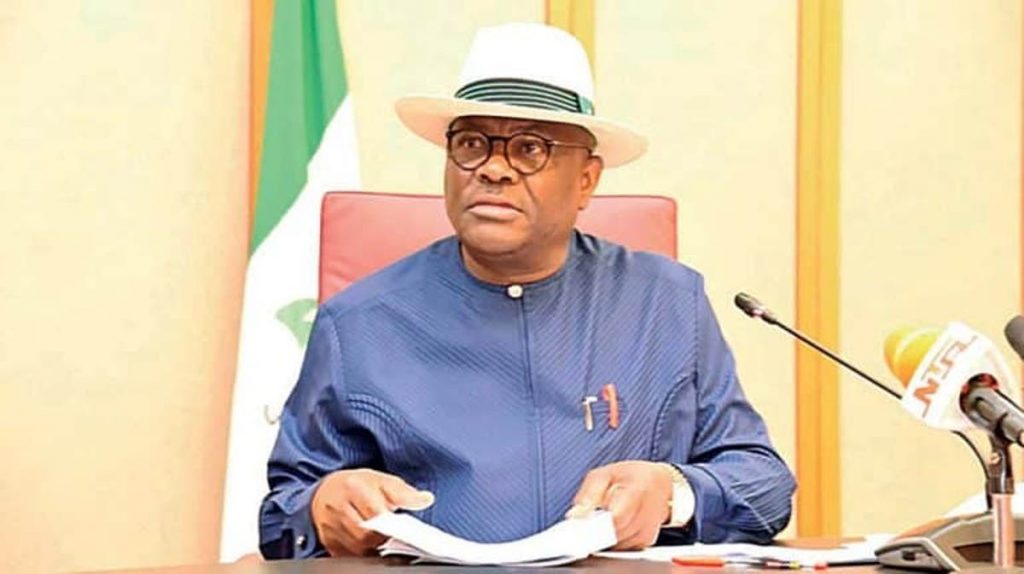Politics
Abbas Withdraws Bill Prescribing Jail Term For Persons Who Refuse To Sing Anthem

Speaker of the House of Representatives, Hon. Abbas Tajudeen has ordered the withdrawal of the Counter Subversion bill sponsored by him which tends to proscribe harsh punishment for those accused of engaging in activities regarded as subversive.
The bill sought to punish between two and twenty-five years imprisonment or a fine of between N2 million and N15 million both on individuals and organizations or both on those found guilty.
The objective of the bill, a copy of which was sighted by The Nation is to (a) Provide for a legal and institutional framework to detect, prevent, investigate, criminalize, prosecute, and sanction subversive and related activities; and regulate the procedure and determine how the provisions of this Act shall be carried out”.
The bill was presented to the House and gazetted as House Bill 1652 on the 23rd of July alongside three bills sponsored by the Speaker and listed on the same day.
The others are counter sabotage bill 2024 (HB 1651), counter-insurgency bill 2024 (HB 1653) and Espionage (Prevention and Prohibition) bill 2024 (HB 1654).
After an initial statement explaining that the bill was not targeted at any individual or group, the Speaker issued another statement withdrawing the bill.
The statement titled: “Withdrawal of the Counter Subversion and Other Related Bills” signed by Special Adviser on Media and Publicity, Musa Abdullahi Krishi, the Speaker said he was withdrawing the bill in response to the voices and concerns of the people.”
READ ALSO: National Anthem Recitation: Fresh Protest Looms Over Controversial Bill
The statement said: “This decision follows his extensive consultations with a broad range of stakeholders and a careful consideration of the nation’s current circumstances.
“Speaker Abbas Tajudeen, a champion of the people’s interests, has always prioritized listening to the citizens and fostering unity. His decision reflects his commitment to ensuring that the House remains truly the People’s House.
“He acknowledges the significance of the concerns raised and the attention the Bill has garnered, reaffirming that he will never support any action that might disrupt the peace and unity of our nation.
“The public is hereby notified of the withdrawal of the Counter Subversion Bill and other related ones introduced on July 23, 2024”.
According to the bill which has 24 clauses, any “person who engages in activities that result to mutual suspicion, mistrust, distrust or intolerance which degenerates into conflict and violence that threatens the corporate existence, peace and security of the Federation of Nigeria, commits an offence and is liable on conviction to a fine of N5,000,000 or imprisonment for a term of 10 years or both”.
The bill also states that “A person who engages in illegal road traffic function, illegal roadblock, imposition of illegal curfew, the conduct of illegal procession, checkpoint, and other similar acts, commits an offence and is liable on conviction to a fine of N2,000,000 or imprisonment for a term of five years or both.
READ ALSO: Controversial Bill: I Choose 20 Years In Prison Than Sing ‘Tinubu’s Anthem’ – Aisha Yesufu
“From the commencement of this Bill, all voluntary or volunteer services groups that seek to provide services under section 3 of this Bill shall be registered with the appropriate authority before rendering the service.
“A person who forcefully takes over any place of worship, town hall, school, premises, public or private place, arena, or a similar place through duress, undue influence, subterfuge or other similar activities, commits an offence and is liable on conviction to a fine of N5,000,000 or imprisonment for a term of 10 years or both.
“A person who professes loyalty, pledges or agrees to belong to an organisation that disregards the sovereignty of Nigeria, commits an offence and is liable on conviction to a fine of N3,000,000 or imprisonment for a term of four years or both.
“A person who makes a statement does something or directs or encourages another person or group to do something that will lead to separatist agitation or intergroup or sectional conflict, commits an offence and is liable on conviction to a fine of N10,000,000 or imprisonment for a term of 25 years or both”.
It said further that “A person who destroys national symbols; refuses to recite the national anthem and pledge, defaces or abuse a place of worship to cause violence and subvert the Government of Nigeria, commits an offence and is liable on conviction to a fine of N5,000,000 or imprisonment for a term of 10 years or both.
READ ALSO: Catholic Bishops To FG: Save Nigerians From Multi Dimensional Poverty
“Clause 9 stipulates that (1) A person who interacts, communicates liaises, associates with locally based cult groups, criminal gangs or proscribed organisations, commits an offence; A person who interacts, communicates, liaises, associates with foreign-based criminal gangs or proscribed organisations or countries detrimental to the welfare, security, development and progress of Nigerian, commits an offence; A person who commits an offence under this section is liable on conviction to a fine of N10,000,000 or imprisonment for a term of 15 years or both.”
It states further that “a person who receives financial or political support from a foreign organisation, group or country that is not compatible with the interest, development, security, and progress of Nigeria, commits an offence and is liable on conviction to a fine of N15,000,000 or imprisonment for a term of 20 years or both”.
“For those receiving foreign aides, it said (1) A foreign-based person, group or organisation that makes statements injurious to the peace and security of Nigeria and relates with or is influenced by a locally based person, group or organisation, commits an offence; (2) A locally based person that fails to refute, condemn, and associate themselves with any statement made by a foreign-based person, group or organisation, commits an offence; (3) A person who commits an offence under this section is liable on conviction to a fine of N5,000,000 or imprisonment for a term of 5 years or both”.
The bill which has now been withdrawn by the Speaker also provided that “every person, group or organisation that engages in activities that undermines national security, harmonious community interaction, peaceful coexistence and the maintenance of law and order, commits an offence and is liable on conviction to a fine of N3,000,000 or imprisonment for a term of five years or both.
READ ALSO: Mother Sues Loyola Jesuit College, Education Ministry For Denying Son Admission
“A person, group or organisation that persistently disregards, disobeys, or disrespects constituted authority, rules, regulations, order or contravenes the law willfully, commits an offence and is liable on conviction to imprisonment for a term of 3 years at the first instance and seven years for a subsequent offence or to a fine of N5,000,000 or both.
“A person who habitually violates the law, refuses or prevents arrest, disrupts legal processes or proceedings, engages in contrary behaviour or persistent and recalcitrant, defiance and rebellion against constituted authority, commits an offence and is liable on conviction to a fine of N5,000,000 or imprisonment for a term of seven years or both.
“A person who establishes, creates, operates or maintains, funds, supports or assists a para-military, guard, brigade, organisation, corps, union, militia, cult or bandit group under whatever name or guise, except established by-laws passed by the National Assembly or State House of Assembly, commits an offence and is liable on conviction to a fine of N10,000,000 or imprisonment for a term of 15 years or both”.
Clause 16 states that (1) A person group or organisation that engages in aggressive, violent or intimidating conduct that results in the death of a person, commits an offence and is liable on conviction to death.
(2) A person group or organisation that engages in conduct that results in grievous bodily harm or loss of property, commits an offence and is liable on conviction to a fine of N5,000,000 or imprisonment for a term of seven years or both and to the payment of adequate compensation to the victim of the crime.”
READ ALSO: National Anthem Recitation: Fresh Protest Looms Over Controversial Bill
Furthermore, the bill had planned to ensure that “A person who illegally constructs a structure or takes over a public place, road or fields without permission from the authority in charge of the place, commits an offence and is liable on conviction to a fine of N1,000,000 or imprisonment for a term of three years or both.
“A person who castigates, instigates, persuades, denigrates, embarrasses or brings into disrepute the leadership of a community, religion, lawful group, local government, State or Federal Government of Nigeria, commits an offence and is liable on conviction to a fine of N4,000,000 or imprisonment for a term of two years or both”.
Other acts that the law would have imposed punishment include conduct that displays loyalty, pledges allegiance to another country or denounces his loyalty to Nigeria as well as persons who inspire, instigate, encourage or direct defiance, mentor, fund or abets or conspire with any person group or organisation in opposition or destruction of an existing state institution, structures or values by illegal conduct or violent acts.
Ownership, possession, production, distribution, importation, handling, and uses abs established security, military, police, or intelligence agency uniforms, emblems, or accoutrements, is supposed to attract a fine of N2,000,000 or imprisonment for a term of two years or both on conviction.
Prosecution of offences provided in the withdrawn Bill was supposed to be as prescribed in the Administration of Criminal Justice Act and subject to the powers of the Attorney-General of the Federation, Legal Officers of the Service shall undertake and conduct prosecution of offences under this Bill.
The bill has been attracting comments from Nigerians since its introduction.
Politics
Dino Melaye Reacts To Malami’s Arraignment For Money Laundering

Ex-Kogi West senator, Dino Melaye, has reacted to the arraignment of a former Attorney General of the Federation, AGF, Abubakar Malami, before an Abuja Federal High Court.
Melaye wished Malami well as he began his trial for corruption.
Posting on X, the former lawmaker recalled how he was prosecuted by Malami over what he described as frivolous cases while he was the AGF.
He wrote: “Reminded me of how I was appearing in different courts when Malami as AGF was prosecuting me over frivolous cases including taking over one of the police cases against me. Wish him.well.”
READ ALSO:JUST IN: Dino Melaye Resigns From PDP, Cites Party’s ‘Lack Of Potency’
Malami, his son Abdulaziz, and another individual are facing a 16-count charge of money laundering.
They were arraigned on allegations of unlawful acquisition and concealment of funds.
They all pleaded not guilty to the charges.
Politics
What PDP Said About Wike’s Media Parley

The Peoples Democratic Party, PDP, has accused the Minister of the Federal Capital Territory, FCT, Nyesom Wike, of being a constant agent of provocation in the political space, alleging that he creates trouble to mask selfish intentions.
The party’s National Publicity Secretary, Ini Ememobong, stated this in a statement issued on Monday in response to Wike’s media parley with selected journalists in Port Harcourt, also held on Monday.
According to the PDP, remarks made by the minister on several occasions are proof that he falls short of being a locus classicus of anti-democratic adventurism.
The party said Wike’s conduct was not new, stressing that he has consistently acted as an agent provocateur in the political arena, stirring controversy to advance personal interests.
READ ALSO:Wike Speaks On Defecting To APC
The PDP further stated that since Wike assumed office as Governor of Rivers State in 2015, he has remained a recurrent source of trouble within the party’s leadership.
“From the Sheriff era, where he was a forerunner in the Sheriff-for-National Chairman movement and later turned to fight and remove Sheriff; later he championed the Uche Secondus-for-National Chairman movement (in fact, he granted a very combustible interview that polarized the party just before the convention) and then was the same person fighting to remove Secondus.
“The same Wike led the movement to produce Dr. Iyorchia Ayu as National Chairman against the advice of many party leaders, and so soon thereafter, it was Wike again who led the Ayu-must-go struggle.
“By his end-of-year media chat, Minister Nyesom Wike has reiterated his support for, and in fact declared that he is the ‘number one supporter’ of the presumptive candidate of the All Progressives Congress in the 2027 Presidential election, while remaining a member of the Peoples Democratic Party, confirming the basis of his expulsion from the PDP, for anti-party activities,” the statement said.
Politics
JUST IN: INEC Excludes PDP From Ekiti Governorship Election

The candidate of the Peoples Democratic Party, PDP, for the 2026 Ekiti governorship election, Dr Wole Oluyede, and his deputy were conspicuously absent as the Independent National Electoral Commission, INEC, released the provisional list of party candidates ahead of the election.
INEC on Monday posted the list of candidates from 12 political parties vying for the state’s top job at its office on New Iyin Road, Ado-Ekiti, Ekiti State.
The list shows that the All Progressives Congress, APC, is fielding the incumbent governor, Biodun Oyebanji, with Monisade Afuye as his running mate.
READ ALSO:Tinubu Sends Ex-INEC Chair, Former Oyo First Lady, 30 Additional Ambassadorial Nominees To Senate
Other candidates include Opeyemi Falegan of the Accord Party, with Omoyemi Olaleye as deputy; Akande Oluwasegun of the African Action Congress, paired with Oluwasanmi Fajuyigbe; and Ayodeji Ojo of the Action Democratic Party, with Itunu Ibitoye as running mate.
Similarly, the African Democratic Congress is presenting Oluwadare Bejide and Paul Olowoyeye, while the Action Peoples Party has Bidemi Awogbemi and Akinyemi Adewumi on its ticket.
The PDP’s absence may not be unconnected with the leadership crisis currently rocking the party at the national level.

 Headline4 days ago
Headline4 days agoJUST IN: US Forces Bomb Terrorists Camps In Nigeria

 News5 days ago
News5 days agoOkpebholo Slams ₦25bn Libel Suit On Edo PDP Chairman

 Headline4 days ago
Headline4 days agoUS Dept Of War Shares Video Of Air Strikes In Nigeria

 News4 days ago
News4 days agoPHOTOS: SGF George Akume Weds Ooni’s Ex-Queen

 News2 days ago
News2 days agoEx-Edo Gov Obaseki Reacts As His Cousin Is Beaten, Stripped

 News1 day ago
News1 day agoBREAKING: Anthony Joshua Involved In Road Accident

 News4 days ago
News4 days agoTrump’s Airstrikes: Halt Military Cooperation With US Immediately – Sheikh Gumi Tells Tinubu Govt

 News4 days ago
News4 days agoShehu Sani Reacts To Trump’s Military Strikes In Nigeria

 Headline4 days ago
Headline4 days agoU.S. Lawmaker Reacts To Nigeria, U.S. Airstrikes

 News5 days ago
News5 days agoChristmas: Otuaro Preaches Peace, Unity In N’Delta, Hails Tinubu’s Support For PAP






























